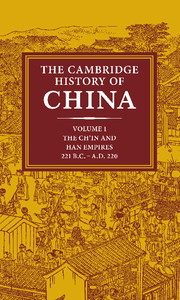Book contents
- Frontmatter
- Introduction
- 1 The state and empire of Ch'in
- 2 The Former Han dynasty
- 3 Wang Mang, the restoration of the Han dynasty, and Later Han
- 4 The conduct of government and the issues at stake A.D. 57–167
- 5 The fall of Han
- 6 Han foreign relations
- 7 The structure and practice of government
- 8 The institutions of Later Han
- 9 Ch'in and Han law
- 10 The economic and social history of Former Han
- 11 The economic and social history of Later Han
- 12 The religious and intellectual background
- 13 The concept of sovereignty
- 14 The development of the Confucian schools
- 15 Confucian, Legalist, and Taoist thought in Later Han
- 16 Philosophy and religion from Han to Sui
- Bibliography
- Glossary-Index
- Map 7 The Han empire, 143 b.c.
- Map 8 The Han empire, 108 b.c
- Map 9 The Han empire, a.d. 2
- Map 12 The Han empire, a.d. 140">
- References
5 - The fall of Han
Published online by Cambridge University Press: 28 March 2008
- Frontmatter
- Introduction
- 1 The state and empire of Ch'in
- 2 The Former Han dynasty
- 3 Wang Mang, the restoration of the Han dynasty, and Later Han
- 4 The conduct of government and the issues at stake A.D. 57–167
- 5 The fall of Han
- 6 Han foreign relations
- 7 The structure and practice of government
- 8 The institutions of Later Han
- 9 Ch'in and Han law
- 10 The economic and social history of Former Han
- 11 The economic and social history of Later Han
- 12 The religious and intellectual background
- 13 The concept of sovereignty
- 14 The development of the Confucian schools
- 15 Confucian, Legalist, and Taoist thought in Later Han
- 16 Philosophy and religion from Han to Sui
- Bibliography
- Glossary-Index
- Map 7 The Han empire, 143 b.c.
- Map 8 The Han empire, 108 b.c
- Map 9 The Han empire, a.d. 2
- Map 12 The Han empire, a.d. 140">
- References
Summary
THE CRISIS OF 168
The reign of Ling-ti (A.D. 168–189) began with a crisis. The court eunuchs felt that they had lost their power with the demise of the previous emperor, and they were desperate to regain it. The leading families and officials were overconfident and reacted too late.
The choice of Ling-ti
On 25 January A.D. 168, Huan-ti (r. 146–168) died, leaving no designated heir. The next day, his wife, the empress Tou (d. 172), was declared empress dowager, a title which gave her the authority needed to validate edicts. At this time she was in her late teens or early twenties.
This was not the first time that the throne had been left vacant, and a rich body of precedent had grown up to deal with just such a situation. The empress dowager, in secret consultation with the most senior male member of her family (in this case her father, Tou Wu, d. 168), was expected to select a candidate who met the following requirements. He should be a young male member of the imperial Liu family, chosen from the noble descendants of Chang-ti (r. A.D. 5–88), who together formed the most senior branch of that family.
In order to secure support for the candidate, and in contravention of established practice, Tou Wu called together a conference of at least eight persons representing various cliques and interests. The Tou family was represented by Tou Wu himself, by his son, and by two of his nephews. The powerful families were represented by Yüan Feng (d. ca. 180), the most senior member of the noble Yüan family, and the bureaucracy was present in the person of Chou Ching (d. 168) who, as supreme commander (t'ai-wei), was the head of all officials.
Information
- Type
- Chapter
- Information
- The Cambridge History of China , pp. 317 - 376Publisher: Cambridge University PressPrint publication year: 1986
References
Accessibility standard: Unknown
Why this information is here
This section outlines the accessibility features of this content - including support for screen readers, full keyboard navigation and high-contrast display options. This may not be relevant for you.Accessibility Information
- 3
- Cited by
